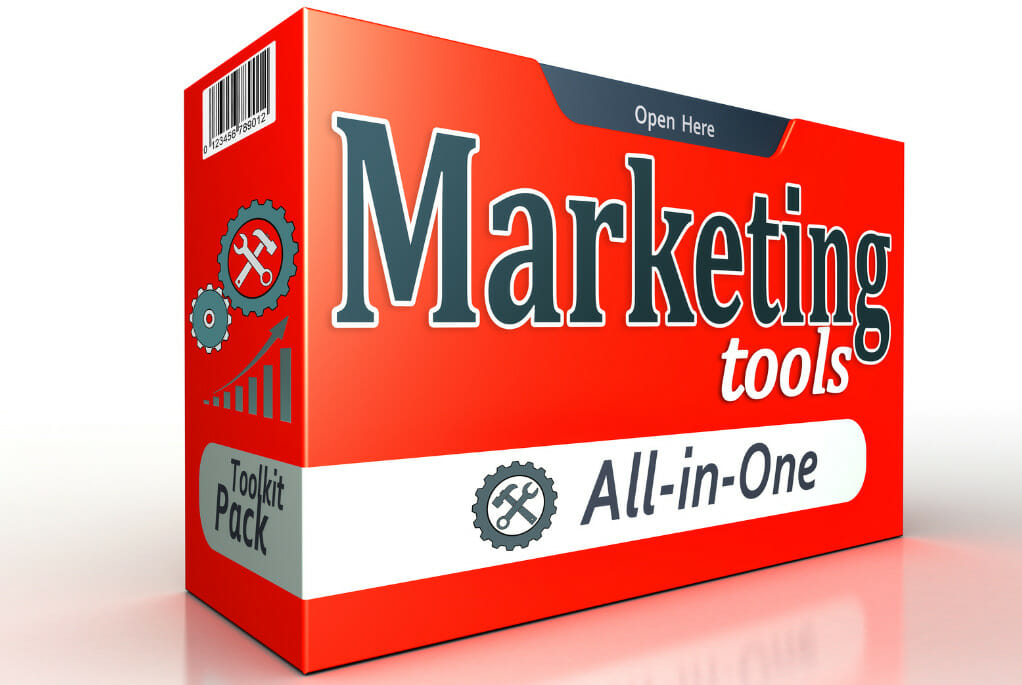
Last month we talked about the importance of sales in small business, and offered some ideas and tools to help support that growth. This month we’re talking all about marketing, tools for small businesses, and solutions for building your brand. If you’re running a marketing team or growing your small business, there’s a long list of helpful (even free) tools to help your business reach the audience you’re after.
Starting with Strategy: Marketing and Sales

We’ve talked about how every business, small or large, needs to integrate their sales and marketing processes. Keeping everyone on the same page is important and there are quite a few digital marketing tools for small businesses that do just that. They’ll allow for you to share information about leads between teams—tools like Salesforce, HubSpot, etc. will integrate with your website so that you can track how your traffic might better support your sales. That information will also help you build a marketing strategy, keeping in mind what your sales and business goals are for the year. This kind of alignment—in communication and operations—will support your brand’s marketing efforts and can turn your online followers into leads.
When it comes to online marketing, you’ll want to develop lead magnets, or offers to your followers and potential customers. “The offer can take a number of formats, should be valuable to your prospects, and is given away for free in exchange for an email address,” says Christina Perricone for HubSpot. These lead magnets are going to be a key component of your content marketing strategy.
Besides the content that you’ll offer, there are tools to help engage and attract potential leads. Installing a chat application is a great way to make your brand more accessible to site visitors. If you want to offer a newsletter to followers (which you should!), you’ll want to give people an easy form to fill out with their contact information. Here are a few digital marketing tools and applications that will help with those efforts:
- Ninja Forms: Easy-to-use forms for site visitors.
- Typeform: Forms and surveys that make sense.
- Zendesk: Chat application to help your website visitors stay in touch.
- LiveChat: Another highly recommended chat.
- HubSpot: Offers chat functionality and forms that integrate with a CRM.
Email Marketing Tools
One of the best ways to share what you offer to customers is a newsletter or email. How often you send these emails will depend on a few factors: your audience, brand marketing goals, offers available, etc. It’s key to be consistent, regardless of the frequency of your emails. And remember that email marketing goes beyond a newsletter—when you develop lead magnets and other resources for your audience, you’ll want to track, follow up, and stay in touch with those followers, even if they haven’t bought anything from you yet. Keep a calendar for these email marketing campaigns, and be sure to make them available to the entire team.
There are quite a few email marketing platforms out there, and you’ve likely heard of some of them. Many of these applications offer free trials so you can get a feel for how to use them. Squarespace and HubSpot both offer email marketing applications that will integrate with your website analytics.

BONUS: There are a few email marketing experts who we especially admire and rely on for ideas. You might benefit from the strategies and tips they offer:
- Liz Wilcox: Liz offers free templates and great ideas for email marketing strategies for small businesses.
- Neal Schaffer: Neal is an expert in email and influencer marketing and has several free downloads and courses to support brands and entrepreneurs.
- Ann Handley: Ann is a digital marketing maven who gives small businesses and brands all kinds of ideas for solid email campaigns and strategies.
Content Marketing Solutions
A solid website can be an all-in-one marketing tool for many small businesses. Once you have your site, forms, newsletter, and other applications set up, you’ll want to think more about all the ways customers might engage with you while they’re there. What types of content will you’ll need to attract those customers (or potential clients)? Blogs are a great place to start, and are a resource for a solid digital marketing strategy.
“Blogging is a great way to generate organic traffic, particularly for those prospects who have not reached a purchasing decision yet. In addition, it can establish credibility in your space and position you as a thought leader,” writes Catharine Boyarsky with HubSpot.
There are several types of content that you can use to attract an audience, however: e-books, digital guides, a video series, downloadable checklist, etc. These types of content are a key component to your lead magnet process, and a significant part of a successful marketing strategy.
But sometimes finding the right images and designs for your content can be tough. Thankfully there are plenty of resources to help you design with ease:
- Pixabay: High quality royalty free images
- Wikimedia Commons: More royalty free images
- Pexels: More free images for you to use
Social Media Marketing Tools
Social media marketing is one of the best ways to support your small business marketing goals. Applications like Facebook, LinkedIn, Instagram, and TikTok give brands a few ways to share content and engage with their fans and followers online.
One of the most important strategies for your social media marketing is about planning and (again) consistency. Ask yourself the following questions to help determine what resources your business needs to be effective online:
- Who will be handling content creation?
- Who will handle social media management and posting?
- What kind of content will we post?
- Which platforms work best for our brand and content?
Design tools like Canva Pro will help you create and schedule your social media posts, and has a huge menu of templates, images, and fonts available.
- Hootsuite helps to automate social media and sends scheduled posts on a few platforms.
- Ocoya will allow you to design and write posts using AI.
- Display Purposes helps generate ideas for relevant, trending hashtags.
- Emojipedia is a great tool to help find the right emojis for your posts.
SEO Tools For Your Small Business Website

Use Google to your business’ advantage by optimizing your site for search engines. It might sound a little like rocket science and a bit intimidating, but search engine optimization, or SEO, is an important part of a digital marketing strategy for small businesses, especially if you’re looking for local customers. “It’s no surprise that search engines are usually one of the biggest traffic sources to websites,” writes Vlado Pavlik for Semrush. “To harness this traffic source’s potential, you need to appear in the top search results for your target keywords.”
There are courses available if you have a little more time to devote to your SEO strategy, but there are also quite a few tools to help with keyword research, so that you can improve your standing in search engine results and drive more traffic to your website:
- Semrush: Tools and courses to help optimize your site.
- Neuron Writer: Write SEO friendly articles to attract more web traffic.
- Headline Generator: Tool from AMI to help you find the right headline for your blogs and web pages.
- Content Row Headline Generator: Another headline generator, with a free and paid version to play with.
And don’t forget to get a Google Business Profile. Not only will it help your SEO, it also enables you to manage and optimize your Business Profile on Google—which is one of many important business directory listings.
Ads and Analytics Tools
Another way to engage online followers is through online advertising. Google, Facebook, Instagram, and LinkedIn all offer marketers a way to boost brand awareness and engage followers.
If you pay to run ads on social media, you’ll need to make sure you’re tracking the investment that you’ve made with analytics tools. When you set up ads through Google, Facebook, etc, you’ll be able to see the analytics on the campaigns that you run. Measuring all of your marketing activities is key to understanding where the largest return on your investment is, no matter how big your marketing budget might be.
Each platform offers a way to manage your campaign, and often have free courses to help brands learn and use these tools:
Make Your Small Business Marketing Work
The list of tools here might be a bit overwhelming, so just pick one or two at a time to work with! “Treat these like your other small business tasks,” says Katharine Chestnut, owner of Alkaloid Networks and lifelong marketer. “Just get them done, remember to breathe, and go to the next thing.”
And if you want support while you play with these marketing tools, find someone to play with! In a coworking space like Alkaloid, there are freelancers, entrepreneurs, and small businesses all growing their businesses here. Quite often we’re all learning the same things, or can help each other with tips and tricks.
What other marketing and small business tools do you use? Have any to add to our list?


Leave a Reply